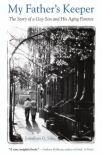My Father's Keeper: The Story of a Gay Son and His Aging Parents, Jonathan Silin [uplifting novels .TXT] 📗

- Author: Jonathan Silin
Book online «My Father's Keeper: The Story of a Gay Son and His Aging Parents, Jonathan Silin [uplifting novels .TXT] 📗». Author Jonathan Silin
I am twelve and answers to my questions remain illusive. My first girl-friend has invited me to attend the Broadway movie premiere of The Diary of Anne Frank along with her mother and older sister. Although Beth is physically more mature and sophisticated, we had enjoyed 102 n jonathan g. silin
each other’s company that summer, enjoyed being one of the camp couples. Once home, however, I had not enjoyed my brother’s inces-sant teasing or my parents’ intrusive curiosity, which was piqued by Beth’s Park Avenue address and her mother’s reputation as a successful art gallery owner.
It’s a miserable winter night, but the torrential rains do not come close to the waves of anticipatory emotion sweeping over me. Much to my embarrassment, my father insists on dropping me off at Beth’s house in a taxi, a trip that under ordinary circumstances I would make on my own. Beth and her family are downstairs waiting, and to my relief it is agreed that they will take me home at the end of the evening.
I enter the theatre that night preoccupied with the logistics of a first date—arrivals and departures, demonstrations of affection and restraint, talk and silences—and am confronted on the screen with the logistics of survival—securing safe shelter, storing up food, avoiding the enemy. Undoubtedly the numbing impact of the movie is heightened by my total lack of preparation for what I am to see. But the black-and-white bleakness of those Amsterdam street scenes, the anxious fear of discovery once the Frank family goes into hiding, and, above all, the stabbing sirens of the SS police cars, become an immediate part of my world, familiar reference points that mark my understanding of the Holocaust. For an adolescent, emerging from a childhood spent listening for strange sounds under the bed and possessing parents who have deep suspicions of anyone outside our close-knit family, The Diary of Anne Frank matches every fear from within with a fear from without. I imagine that Beth and her sister may have cried during the movie, but all that remains for me of that night is our stunned silence when the theatre lights finally come on.
Beth and I go out on a few more dates that winter. Although she runs with a faster crowd than my own elementary school friends, it is not her lack of interest but rather my own feelings of inadequacy that cause the relationship to slip away. Beth does not return to camp that following summer, and, when next I see her five years later, she has m y fat h e r ’ s k e e p e r n 103
turned into a tall, slender, and stunning woman of seventeen. Needless to say, I am still intimidated but in quite a different way.
When we are young and study history, it is always somebody else’s story, another world that we learn about. Then, with the passing of the decades, suddenly we find ourselves reading about a past that we have actually lived. Each of us participates in a world that at some future point may be described, interpreted, and judged by others.
In Lost Subjects, Contested Objects, Deborah Britzman writes a history of Anne Frank’s diary—its discovery, editing, publication, reception, and ultimate transformation into theatre and film. Now I can place my date with Beth in historical context. The sirens that punctuate my dreams can be heard within the debates about how to interpret the pages that Miep Gies and Bep Voskuijl, the two secretaries who help to keep the Franks alive for so long, find scattered across the floor of the secret annex after its discovery by the SS and Dutch Security Police. Do they, as Otto Frank suggests, tell a universal story of adolescence or are they, as the journalist Meyer Levin claims, the record of an unprecedented historical event? Does Anne speak about the perseverance of the human spirit in the face of adversity or is her voice powerfully but uniquely “the voice of six million Jewish souls”?
At age twelve I am largely unmoved by the so-called universal aspects of Anne’s story. I experience the movie as a Jew, frightened by the graphic images of life in hiding and ultimate discovery. I do not go on to read the diary itself at that time, nor do I knowingly see other movies about the Holocaust.
Given the strong impression left by the movie, I was surprised by my response when, several years ago, I took up the book in an attempt to exorcise my childhood demons. I was drawn to its poignantly adolescent themes—the struggle for independence, the growing self-consciousness and critique of adults, the longing for a soul mate.
These have undoubtedly been heightened in the 1991 definitive edition that contains material Anne’s father thought too sexually explicit or damaging to his family to be included in the original 1947
104 n jonathan g. silin
version. Two-thirds of the way through the book, my reading pace slowed to a few entries a day. I grasped the dwindling number of remaining pages between my fingers with the same sad certainty that I grasped the fate awaiting the Franks. Otto Frank and Meyer Levine were both right. The diary is of a particular time and place even as it transcends that moment through the depiction of fundamental human emotions.
When I was growing up, my parents’ silences about social issues offered me many lessons about what might be





Comments (0)